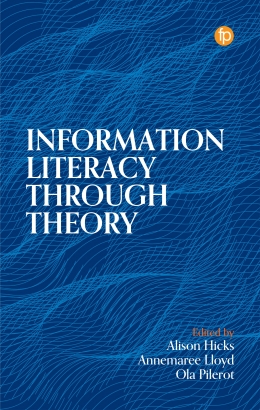
Primary tabs
You don't need to be an ALA Member to purchase from the ALA Store, but you'll be asked to create an online account/profile during checkout to proceed. This Web Account is for both Members and non-Members. Note that your ALA Member discount will be applied at the final step of the checkout process.
If you are Tax-Exempt, please verify that your account is currently set up as exempt before placing your order, as our new fulfillment center will need current documentation. Learn how to verify here.
- Description
- Table of Contents
- About the authors
- Reviews
This book provides a focal point for researchers, practitioners, and students interested in the creation and advancement of conceptually rich information literacy research and practice.
Information literacy research is growing in importance, as evidenced by the steady increase in dissertations and research papers in this area. However, significant theoretical gaps remain. Information Literacy Through Theory provides an approachable introduction to theory development and use within information literacy research. It provides a space for key theorists in the field to discuss, interrogate and reflect on the applicability of theory within information literacy research, as well as the implications for this work within a variety of contexts. Each chapter considers a particular theory as its focal point, from information literacy and the social to information literacy through an equity mindset, and unpacks what assumptions the theory makes about key concepts and the ways in which the theory enables or constrains our understanding of information literacy.
- Introduction: Themes, Patterns and Connections Alison Hicks, Annemaree Lloyd, Ola Pilerot
- Democracy and Information Literacy John Buschman
- Information Literacy and the Social: Applying a Practice Theory View to Information Literacy Annemaree Lloyd
- Information Literacy in a Nexus of Practice: a Mediated Discourse Perspective Noora Hirvonen
- The Radical and the Radioactive: Grasping the Roots of Theoretically Informed Praxis in Brazilian Studies on Critical Information Literacy Arthur Bezerra and Marco Schneider
- Locating Information Literacy Within Discursive Encounters: A Conversation with Positioning Theory Alison Hicks
- Plural Agonistics Johanna Rivano Eckerdal
- Critical Literacy and Critical Design Veronica Johansson
- Information literacy through an equity mindset Amanda Folk
- Sociomateriality Jutta Haider and Olof Sundin
- Surfacing the body: Embodiment, Site and Source Annemaree Lloyd
- Variation Theory : Researching Information Literacy Through the Lens of Learning Clarence Maybee
- Information Literacy: What Consciousness and Cognition Can Teach Us John Budd
- Information Literacy Theorised Through Institutional Ethnography Ola Pilerot
- Conclusion: Alerting us to Difference. Alison Hicks, Annemaree Lloyd, Ola Pilerot
Alison Hicks
Alison Hicks is Assistant Professor and Programme Director, Library and Information Studies at University College, London (UCL). Her research primarily focuses on how information literacy practices help people to cope with uncertainty, including risk and transition, within academic, health, everyday and work contexts. She is additionally interested in qualitative, visual and participatory information literacy research methods and is the Editor-in-Chief of the Journal of Information Literacy. With a PhD from the Swedish School of Library and Information Science, University of Borås and an MSIS from the University of Texas, Austin, Alison worked as an academic librarian at the University of Colorado, Boulder and the Inter-American Development Bank for ten years prior to taking up her position at UCL.
Annemaree Lloyd
Annemaree Lloyd is a social science researcher based at the Department of Information Studies, University College London (UCL). Internationally, Annemaree has held a professorial post at the Swedish School of Library and Information Science (SSLIS), University of Borås, and is visiting professor at the School of Computing and Information Sciences, University of Strathclyde. Prior to that, Annemaree worked at the School of Information Studies, Charles Sturt University, Australia. She is engaged with theoretical and empirical work associated with the development of information practice, information literacy theory and landscape methodology across a number of fields. In the workplace, her research has focused on the experience of learning working practice and performance; in the area of refugee and forced migration her research has focused on the impact of information literacy on social inclusion and transition; in the health information field, Annemaree has explored nurses' workplace learning and health literacy in relation to refugee knowledge construction and information practices of people with chronic illness. Annemaree is the author of Information Literacy Landscapes: Information Literacy in Education, Workplace and Everyday Contexts (2010) and has published over 100 peer reviewed journal articles and book chapters on information literacy theory and practice.
Ola Pilerot
Ola Pilerot is Professor at the Swedish School of Library and Information Science (SSLIS), University of Borås, where he teaches and publishes within the field of information practices. Together with Professor Jutta Haider he leads the research group Information practices and digital cultures at SSLIS. He is widely published in international peer reviewed journals, including Journal of Documentation, Information Research, Journal of the American Society for Information Science and Technology, Library Trends, and Journal of Librarianship and Information Science.
Have you read this book? Leave a review!
Praise for Information Literacy Through Theory
"Not only an invaluable collection of leading theorists in the field of information literacy, this title includes unique and provocative insights into how people engage with and make sense of information environments using sound theoretical bases. Hicks, Lloyd, and Pilerot have assembled a landmark volume that makes a resounding case for applying theory to information literacy research in a meaningful way, thereby allowing the field to truly grasp the complex social nature of information literacy. Chapter authors each introduce and analyse a different theory in accessible but rigorous manners, making this book of great interest to library and information science students, researchers, and practitioners who seek to understand information literacy theories and apply them to their work.”
— Eamon Tewell, Head of Research Support and Outreach, Columbia University Libraries


